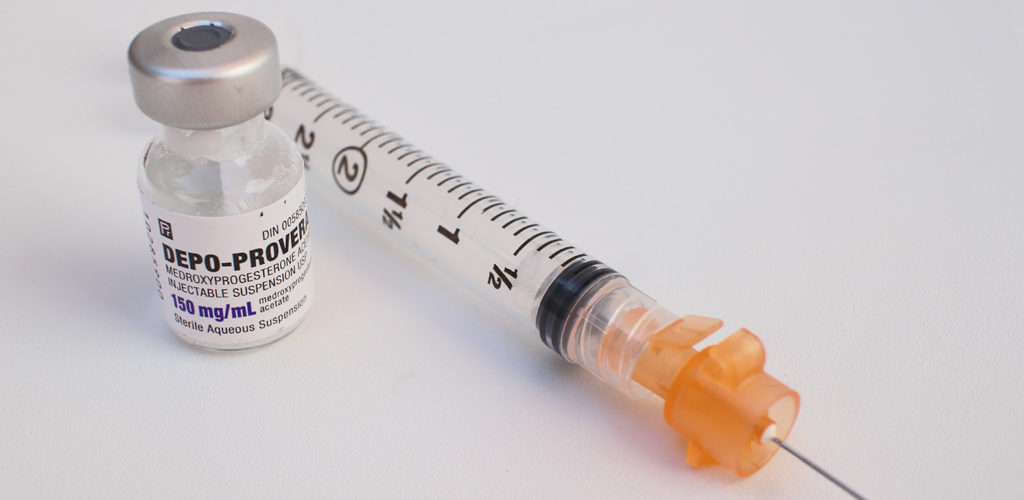Injection (The Shot)
What is the injection?
- The injection is a shot containing one hormone (progestin) that you are given once every 12-13 weeks/3 months.
- It is sometimes called Depo-Provera or Depo.
How does the injection prevent pregnancy?
- In order to get pregnant, sperm must enter your vagina*, swim up into your uterus and fertilize an egg that has been released from your ovaries during ovulation. The injection prevents you from ovulating.
- The injection thickens the mucus on your cervix (the opening of the uterus). This makes it harder for sperm to travel into your uterus and fertilize an egg.
- The injection also thins the lining of your uterus (the endometrium). This makes it harder for a fertilized egg to implant in your uterus and become a pregnancy.
How effective is the injection?
- The injection is 99.7% effective. This means that if 1000 people used the injection correctly for one year, only 3 people would get pregnant.
- Because the injection may be used incorrectly, it is closer to 97% effective with typical use.
- If you use the injection incorrectly (e.g. you don’t get your next dose injected on time), your risk of getting pregnant increases.
How do you use the injection?
- A clinician will give you an injection in the arm or butt every 12-13 weeks/3 months.
How to start the injection
- If you decide, along with your clinician, that the injection is right for you, they will write you a prescription. You can purchase your dose of the injection at a pharmacy (approximately $35/3 months) or at PPT’s Health Services (approximately $15/3 months).
- If you have your first injection within the first 5 days of getting your period, you only have to wait 24 hours before you are protected from pregnancy.
- If you have your first injection 6 or more days after getting your period, you are not protected from pregnancy until it has been a full week since your injection. To avoid pregnancy during this time, use a back-up method of birth control like condoms or spermicides.
- Because of the potential impact on your bone density (see next section), your clinician may limit the number of years you can use the injection unless no other method of birth control is right for you.
What are the side effects of the injection?
- You may experience side effects such as decreased libido, headaches, acne, breast* tenderness, and nausea. These side effects may go away over time.
- You may have unpredictable bleeding during the first few months of use, but this should go away over time. After a year, around half of people will stop getting their periods altogether while they are using the injection.
- The injection may make you feel hungrier than usual and you could gain weight. In the first year, the average amount of weight gain is 5 pounds. The amount of weight gain increases the longer you use this method.
- If you have a history of depression or other mood disorders, talk to your doctor to see if the injection is right for you.
- A return to your full fertility (your ability to get pregnant) may be delayed after stopping the injection. On average it takes 9 months from your last injection for your normal menstrual cycle to return.
- The injection can cause you to lose bone mineral density. This means your bones could become weaker and thinner the longer you use the injection. The impact may be greater the younger you are. However, your bones should become stronger and thicker again after you stop using the method.
- There are things you can do to maintain your bone strength while using the injection, such as not smoking and increasing your calcium intake. Talk to your clinician for more information.
Advantages of the injection
- If you always get your injection on time, your chance of pregnancy is very low.
- You don’t have to do anything before or after you have sex.
- You don’t have to remember to do something every day, just once every 12-13 weeks/3 months.
- You can use this method if you cannot use birth control with estrogen in it.
- You can use this method if you are breastfeeding.
- You may not bleed as much during your period, or you may stop getting your period altogether while you are using the injection.
- You don’t have to rely on your partner(s) to use this method.
- If you want to keep your birth control use private, there is no packaging to be found.
- The injection lowers your chances of cancer in the lining of the uterus (endometrium).
Disadvantages of the injection
- You have to be able to get to a clinic for your injection every 12-13 weeks/3 months.
- If you are late getting your shot, your chances of getting pregnant are higher. You may need to use a back-up method of birth control like condoms or spermicides for seven days (one week).
- You may not feel comfortable with needles.
- You may experience side effects.
- You may not be able to use the injection if you have certain health problems.
- Some people may not be comfortable using a method that can take their period away.
- The injection is the only birth control method that decreases bone density. Your clinician may limit the number of years you can use the injection unless no other method of birth control is right for you.
- If you don’t like this method, you may have to wait up to 3 months after your last injection for the side effects to go away.
- You need a prescription.
- The injection does not protect you from sexually transmitted infections (STIs).
For a downloadable resource on this topic, please visit Planned Parenthood Toronto Factsheet Database.
If you have questions about this topic, feel free to contact one of our peer educators. [Link]
*We know that these aren’t the words everyone uses for their bodies (eg. trans folks), and support you using the language the feels best for you.
Last Edited: May 2020






